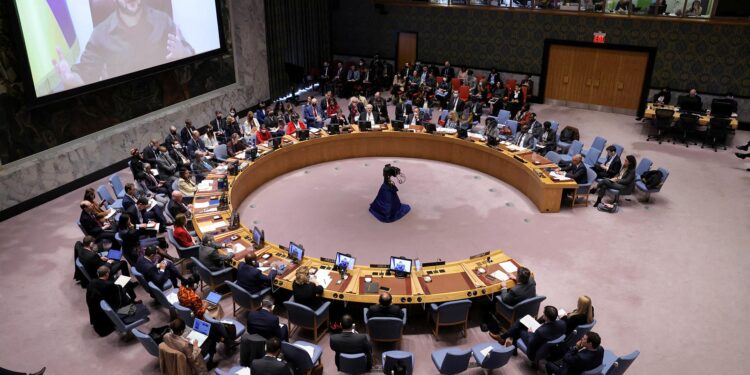The UN Security Council has rejected a joint resolution proposed by China and Russia aimed at extending sanctions relief for Iran’s nuclear program, just days before the current measures were set to expire. The move marks a significant setback for Beijing and Moscow, who sought to ease restrictions amid ongoing concerns over Tehran’s nuclear activities. Western members of the Council opposed the resolution, emphasizing the need to maintain pressure on Iran to ensure compliance with international nuclear agreements. The decisive vote reflects the deep divisions within the Security Council as global powers grapple with the complex dynamics of Iran’s nuclear ambitions.
UN Security Council Blocks China-Russia Proposal to Extend Iran Nuclear Sanctions Relief
The United Nations Security Council decisively rejected a joint proposal from China and Russia aimed at prolonging relief from sanctions imposed on Iran’s nuclear program. The resolution, which sought to ease restrictions ahead of a looming deadline, failed to secure the necessary support amidst mounting geopolitical tensions. Critics argue the move highlighted the deep divisions within the council, as Western members opposed measures they believe could undermine non-proliferation efforts and embolden Tehran’s nuclear ambitions.
The vote underscored explicit concerns over compliance and verification mechanisms, with advocates for the sanctions extension emphasizing the need for stringent monitoring. Key points raised during discussions included:
- Concerns over Iran’s uranium enrichment activities and potential breaches of the 2015 nuclear agreement.
- Calls for sustained international pressure to prevent regional destabilization.
- Challenges in balancing diplomatic engagement with enforcement of punitive measures.
| Country | Position | Reason |
|---|---|---|
| China | Support | Advocates for easing sanctions |
| Russia | Support | Seeks diplomatic solution |
| United States | Oppose | Focus on pressure and verification |
| United Kingdom | Oppose | Concerns over nuclear proliferation |
| France | Oppose | Demand strict enforcement |
Implications of the Rejection on Global Non-Proliferation Efforts and Regional Stability
The Security Council’s refusal to adopt the proposed extension of sanctions relief on Iran marks a significant juncture for global non-proliferation endeavors. This decision signals a heightened sense of urgency among member states to prevent the erosion of diplomatic tools designed to curb Tehran’s nuclear ambitions. By maintaining sanctions pressure, the international community aims to reinforce deterrence and discourage any illicit nuclear development activities. However, the rejection also reflects deep-seated divisions among major powers, potentially impeding consensus on future measures and complicating the unified front necessary for sustained non-proliferation diplomacy.
From a regional perspective, the fallout from the Security Council’s decision could intensify geopolitical volatility in the Middle East. Key stakeholders may perceive the sanctions impasse as a catalyst for accelerating arms races and hardening alliances. Below is a brief overview of potential regional ramifications:
- Heightened Tensions: Increased distrust among Gulf Cooperation Council (GCC) nations toward Iran’s intentions.
- Proxy Conflicts: Reinforcement of local militias aligned with external powers could escalate ongoing conflicts.
- Diplomatic Strain: Reduced space for dialogue between Iran and Western governments.
| Implications | Potential Impact |
|---|---|
| Non-Proliferation Enforcement | Stronger sanctions may delay nuclear progress, but risk diplomatic breakdowns |
| Regional Alliances | Shifts towards militarization and hardening sectarian divides |
| Security Council Dynamics | Deepened fissures between Western and Sino-Russian blocs |
Strategic Recommendations for Diplomats to Address Iran Sanctions Ahead of Upcoming Deadlines
With the UN Security Council’s rejection of the China-Russia draft resolution to extend Iran’s nuclear sanctions relief, diplomats face a narrowing window to recalibrate strategies addressing the impending deadlines. Emphasis must shift toward fostering multilateral dialogue that balances enforcement with diplomatic engagement, ensuring collective pressure aligns with broader non-proliferation objectives. Policymakers are advised to prioritize transparent communication and leverage existing alliances to sustain unified stances, mitigating the risk of fracturing within the council.
Critical recommendations for advancing this agenda include:
- Strengthening coalition cohesion: Enhancing coordination among Western and regional partners to present a consolidated front in negotiations.
- Incremental sanctions approach: Applying targeted measures that encourage compliance without pushing Iran towards escalatory responses.
- Engagement with neutral actors: Inviting input from influential but neutral states to mediate and reduce polarization.
- Transparent deadline management: Establishing clear timelines for review and revision to maintain credible diplomatic pressure.
| Strategy | Expected Outcome | Timeframe |
|---|---|---|
| Unified Security Council Statements | Prevent diplomatic divide | Immediate |
| Targeted Economic Incentives | Encourage compliance | 3-6 months |
| Multilateral Mediation Efforts | Reduce tensions | 6-12 months |
The Way Forward
The UN Security Council’s rejection of the China-Russia resolution marks a significant moment in the ongoing international debate over Iran’s nuclear program and associated sanctions. With the deadline looming, member states remain deeply divided on the best path forward, reflecting broader geopolitical tensions. As the council continues negotiations, the global community watches closely, aware that the outcomes will have far-reaching implications for regional stability and nonproliferation efforts. Further updates are expected as diplomatic efforts persist to find a consensus before sanctions relief expires.
















